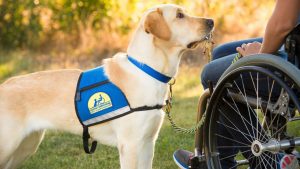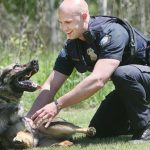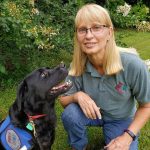Texas veterans unite with service dogs
April 3, 2020

In October 2008, Army Captain Alli LaCombe was just two weeks away from coming home to Keller, Texas, from her second deployment in Iraq when her life changed in an instant. Her unit was in the countryside preparing a space for incoming American troops when insurgents broke through the perimeter of the site and a firefight broke out. Responding to the commotion, LaCombe stepped outside her tent without protective gear. After hearing gunshots, she turned to retrieve her gear when a rifle round smashed into her spine, leaving her permanently paralyzed from the waist down.
After being airlifted to a hospital in Germany, LaCombe underwent multiple surgeries to remove shrapnel fragments from her spine, though some remain in her body to this day. From there, she was transferred to Brooke Army Medical Center in San Antonio for six intense, arduous months of physical therapy.
Finally, LaCombe returned to her home in Keller, which unfortunately was not wheelchair accessible. The house had two stories, and most doorways were not wide enough for a wheelchair. Those circumstances made everyday activities, like going into the bathroom or taking a shower, a serious challenge for her.
In October 2008, Army Captain Alli LaCombe was just two weeks away from coming home to Keller, Texas, from her second deployment in Iraq when her life changed in an instant. Her unit was in the countryside preparing a space for incoming American troops when insurgents broke through the perimeter of the site and a firefight broke out. Responding to the commotion, LaCombe stepped outside her tent without protective gear. After hearing gunshots, she turned to retrieve her gear when a rifle round smashed into her spine, leaving her permanently paralyzed from the waist down.
After being airlifted to a hospital in Germany, LaCombe underwent multiple surgeries to remove shrapnel fragments from her spine, though some remain in her body to this day. From there, she was transferred to Brooke Army Medical Center in San Antonio for six intense, arduous months of physical therapy.
Finally, LaCombe returned to her home in Keller, which unfortunately was not wheelchair accessible. The house had two stories, and most doorways were not wide enough for a wheelchair. Those circumstances made everyday activities, like going into the bathroom or taking a shower, a serious challenge for her.
In October 2008, Army Captain Alli LaCombe was just two weeks away from coming home to Keller, Texas, from her second deployment in Iraq when her life changed in an instant. Her unit was in the countryside preparing a space for incoming American troops when insurgents broke through the perimeter of the site and a firefight broke out. Responding to the commotion, LaCombe stepped outside her tent without protective gear. After hearing gunshots, she turned to retrieve her gear when a rifle round smashed into her spine, leaving her permanently paralyzed from the waist down.
After being airlifted to a hospital in Germany, LaCombe underwent multiple surgeries to remove shrapnel fragments from her spine, though some remain in her body to this day. From there, she was transferred to Brooke Army Medical Center in San Antonio for six intense, arduous months of physical therapy.
Finally, LaCombe returned to her home in Keller, which unfortunately was not wheelchair accessible. The house had two stories, and most doorways were not wide enough for a wheelchair. Those circumstances made everyday activities, like going into the bathroom or taking a shower, a serious challenge for her.
Those who qualify to apply for the program include people with physical or developmental disabilities; adults who are deaf or hard of hearing; and professionals working in health care, visitation, educational or criminal justice settings who can demonstrate that an assistance dog will enhance their independence or quality of life.
The comprehensive application process begins with an exchange of basic information to make sure the program will be a good fit for the applicant’s needs. Experienced Canine Companions for Independence staff review the applicant’s needs and qualifications to determine if the process will continue. If the applicant is accepted, the wait time can vary depending on the kind of canine assistance required. Canine Companions strives to invite each candidate to be matched with an assistance dog within 12 months; however, class invitations rely on availability of suitable dogs.
The dogs — Labrador Retrievers, Golden Retrievers and Lab/Golden crosses — are trained for up to two years. They are valued at about $50,000 for their lifetime, but recipients pay nothing for their dogs. After receiving some basic training from volunteers, the dogs are taken to one of the six regional training centers for more advanced work, during which they learn up to 40 assistance commands. Once matched with their recipients, the dogs work for about eight years, after which they can retire and spend their golden years as pets.
Even after they place a dog in a home, Canine Companions for Independence follows up with every team for the lifetime of the placement. This includes in-person visits, reunions, workshops, and phone or email support — even a 24/7 help line for emergencies. Recipients are personally and financially responsible for meeting the dog’s day-to-day needs, including food, veterinary care, exercise and grooming.
Program expands to include veterans with PTSD
To assist the number of military personnel returning from service with post-traumatic stress disorder (PTSD), Canine Companions for Independence launched a pilot program to place service dogs with veterans with PTSD in 2015. In this facet of the program, dogs are trained to perform tasks that include nightmare interruption, turning on lights, retrieving items and supporting their handler in crowded public situations that might provoke anxiety.
The campus in Irving is the third Canine Companions location in the United States to grow its programming to serve veterans with PTSD. To date, the organization has placed more than 300 service dogs with veterans nationwide, and Alli LaCombe is one of them. While LaCombe’s service dog was matched to help with her physical disabilities, the expanded PTSD program will offer specific training to support veterans diagnosed with PTSD.
Since their graduation from the program, LaCombe and Erik have been inseparable companions, and LaCombe now lives a robust and fulfilling life. She works full-time for the State of Texas.
In addition to being her constant companion in all these activities, Erik potentially saved LaCombe’s life during a near-tragic incident in July 2019. Because severe spinal cord injuries interfere with the body’s normal responses to heat and cold, LaCombe suffered a heat stroke and lost consciousness. Erik began barking to summon help, and when colleagues and emergency medical personnel found her, she was unresponsive and her temperature had soared to 104° F.
LaCombe survived (though full recovery took more than a month), but the outcome could have been very different had Erik not been there to call for help. Looking back on that incident and the life she and Erik have shared over the past three years, LaCombe says simply: “He has awed me to tears.”
If you or a family member think you may qualify for canine assistance, you can apply at Canine Companions for Independence’s website. There you’ll also find information about making donations or volunteering to raise puppies for the program.
Applicants for the program must be United States Armed Forces veterans with a PTSD diagnosis and live anywhere within the state of Texas, or other select regions throughout the country. The process to receive a Canine Companions assistance dog involves multiple steps. Veterans are invited to review the application information and contact Canine Companions for Independence if they are interested in applying.













